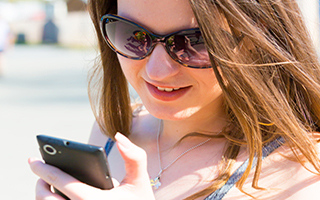
If you've ever tried to use your phone or tablet in direct sunlight, you were probably frustrated by how difficult it is to see the screen. But instead of being frustrated, you may want to be thankful. Why? New research indicates that using a mobile device in the sunlight could actually be dangerous to your health.
When you use one of these devices in the sunlight, the screen is hard to see because it's reflecting so much light. But where exactly does that light end up? According to a small research study, much of it is actually hitting you in the face.
The researchers, Mary E. Logue and Dr. Barrett Zlotoff of the University of New Mexico were wondering if these screens worked a bit like tanning reflectors. To test this, they set up a mannequin head wearing a UVA/B light meter in a sunny area. In front of the mannequin, they placed a standard musician's sheet stand holding a variety of devices.
In one trial, they located the devices 16.5 inches from the UV sensor and angled them to resemble our typical posture when looking at these devices. They recorded UV exposure from 11 a.m. to noon and compared the readings obtained when using the devices to those obtained when the sheet stand was empty.
Banish Puffy Eyes!
This gravity-defying cream contains over 30 ingredients, including an Essential Fatty Acid Complex, Sandalwood and Barley Extracts to help rehydrate, reduce puffiness, and help minimize the appearance of lines and wrinkles.
Learn More Now
At first, they measured exposure simply using a regular magazine. That increased UV dosage exposure by 46%. That's high in and of itself. But then they found that an iPad2 and an 11-inch MacBook increased exposure by 85% and 75%, respectively.
For the second trial, the researchers positioned an iPhone5 12.25 inches from the sensor. Even this small device increased exposure by 36%.
While further research is needed to see if there's a direct link between using these devices outdoors and an increase in skin cancer risk, we know that over time UV exposure increases your chances of developing the disease and accelerates the aging of the skin. Logue explained, "The harmful effects of UVA and UVB rays have been well documented, and limiting exposure is the single most effective preventative measure an individual can take. Significant levels of UV exposure, such as those found in this study, increase cumulative lifetime UV dosage."
Logue continued, "While the best course of action is to limit smart device usage to indoors, this is obviously impractical for most people. We recommend covering the shoulders, wearing sunglasses, and wearing sunscreen, especially on the exposed areas of the neck and face."
I love my iPhone and iPad, so this was sobering news for me. It's a great reminder to always, always wear some kind of sunblock, even when I'm lazy and might think it's unnecessary, and to be more selective about using my devices outdoors. If the screen is difficult to make out, that's probably a sign that it's best to wait until later. Rather than straining your eyes and potentially damaging your skin, you can protect both by putting your devices away when you're in strong sunlight.
Better Health and Living for Women,

Janet Zand
Source:
http://mobile.reuters.com/article/idUSKCN0R320620150903